五年级(下册)英语课本知识点总结
五年级下册英语知识点归纳整理总结
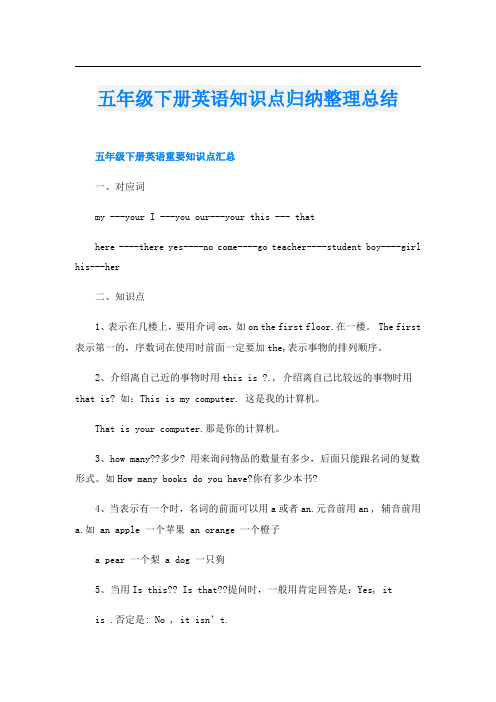
五年级下册英语知识点归纳整理总结五年级下册英语重要知识点汇总一、对应词my ---your I ---you our---your this --- thathere ----there yes----no come----go teacher----student boy----girl his---her二、知识点1、表示在几楼上,要用介词on,如on the first floor.在一楼。
The first 表示第一的,序数词在使用时前面一定要加the,表示事物的排列顺序。
2、介绍离自己近的事物时用this is ?., 介绍离自己比较远的事物时用that is? 如:This is my computer. 这是我的计算机。
That is your computer.那是你的计算机。
3、how many??多少? 用来询问物品的数量有多少,后面只能跟名词的复数形式。
如How many books do you have?你有多少本书?4、当表示有一个时,名词的前面可以用a或者an.元音前用an , 辅音前用a.如 an apple 一个苹果 an orange 一个橙子a pear 一个梨 a dog 一只狗5、当用Is this?? Is that??提问时,一般用肯定回答是:Yes, itis .否定是: No , it isn’t.三、句子:1、This is the teacher’s office.这是老师办公室。
2、That is my classroom.那是我的教室。
3、Go to the library. Read a story-book..去图书馆。
读故事书。
4、Is this the library? Yes, it is.这是图书馆吗?是的。
5Is that the art room? The art room is on the second floor.那是美术室吗?不是,美术室在二楼。
PEP五年级下册英语知识点整理
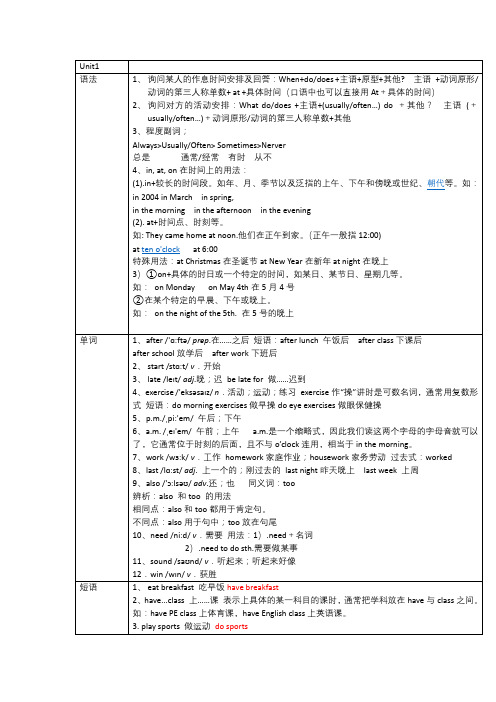
11、sound /saʊnd/v.听起来;听起来好像
12.win /wɪn/v.获胜
短语
1、eat breakfast吃早饭have breakfast
2、have...class上……课表示上具体的某一科目的课时,通常把学科放在have与class之间。如:have PE class上体育课,have English class上英语课。
on vacation度假同义词:holiday
4、lovely /lʌvli/adj.可爱的;美丽的
5、leaf /liːf/n.叶子复数:把leaf中的f变v,再加es,即leaves。
6、fall /fɔːl/v.落下n.秋天在美式英语中多用fall表示“秋天”,而英式英语
fall behind落后fall down落下
2、spring /sprɪŋ/n.春天在某个季节用介词in
summer /'sʌmə/n.夏天、跌势
autumn /'ɔːtəm/n.秋天in autumn在秋天early autumn初秋同义词:fall
winter /'wɪntə(r)/n.冬天
3.vacation /və'keɪʃn/n.假期summer vacation暑假winter vacation寒假
2、询问喜欢某个季节的原因:Why?/ Why do/does主语like、、、best?
Because….
because /bɪ'kɔːz/conj.因为用来连接表示因果关系的句子,后面跟表示原因的句子。
because of因为;由于+名词
ቤተ መጻሕፍቲ ባይዱ单词
(完整版)人教版五年级英语下册Unit1知识点汇总

Unit1 My day 知识整理△话题:谈论每天的活动及时间安排△词汇:do morning exercises(做早操)eat breakfast/lunch/dinner(吃早餐/午餐/晚餐)have...class(上…课),play sports(做运动)clean my room(打扫我的房间),go for a walk (散步) go shopping(购物),take a dancing class(上舞蹈课)△拓展词汇:get up(起床), go to bed(上床睡觉)wash my clothes(洗我的衣服), watch TV(看电视)do homework(做作业), play music(演奏音乐)cook dinner(煮晚餐), at home(在家)in the morning(在上午),in the afternoon(在下午)in the evening(在晚上),at night(在半夜)△句型:①询问做某事在几点When do you+动词原形(短语)+其他?—— At +时间—— I(+频度副词)+动词原形(短语)+at+时间。
例句:When do you get up in the morning?—— At 7:30.—— I often get up at 7:30.②询问周末的活动安排What do you often do on the weekend?I often (always/sometime/usually) +…(周末的活动)+with … (某人)+on the weekend (on Saturdays/on Sundays ).例句:What do you do on the weekend ?I often take a dancing class with my friend on Sundays. △知识点:1:注意介词的搭配at +具体时间(几点)/night/home at 9 o ’clock in +国家/季节 in Spainon +星期 on the weekend/on Sundays with +人 with my father/mother/friend 2:表示时间频率词的区别always 表示总是,一直;usually 表示经常,通常;often 表示经常,常常;sometimes 表示有时,间或。
小学五年级英语下册知识点归纳总结(最新最全)

英语下册知识点总结一、重点短语1. look at 看一看2. over there 在那边3. in English 用英语4. excuse me 打扰了5. in the pond 在池塘里6. play with 和… 一起玩7. of course 当然8. swim well 游泳好9. pet shop 宠物店10. a lot of 很多11. jump through a ring 越过圆环12. ride a horse 骑马13. ride a bike 骑自行车14. climb up a ladder 爬梯子15. come here 过来16. come along 过来17. come with me 跟我来18. show… around 带…参观19. this way 这边走20. borrow … from 从…借21. borrow books 借书22. read stories 读故事23. make things 制作东西24. speak English 说英语25. draw pictures 画画26. have art classes 上美术课27. dance room 舞蹈教室28. how often 多久一次29. science lab 科学实验室30. language lab 语音室31. how many 多少32. other activities 其他活动33. do experiments 做实验34. do listening 练听力35. observe things 观察事物36. do speaking 练口语37. New Year’s Day 元旦38. meeting hall 会议大厅39. Children’s Day 儿童节40. be good at 擅长41. be interested in 对…感兴趣42. music club 音乐俱乐部43. no one 没有人44. play the violin 拉小提琴45. art club 美术俱乐部46. come into 进入47. listen to music 听音乐48. cut out 剪下49. come from 来自50. up and down 上上下下51. in groups 成组52. science corner 科学角53. group work 小组活动54. do project work 做项目制作55. art corner 美术角56. computer corner 电脑角57. play football 踢足球58. be famous for 因…闻名59. study plants and animals 研究动植物 60. do exercises 做运动61. on the field 在操场上62. do printing on the paper 在纸上印刷63. how about …怎么样?64.go on field trips 田野考察65. play volleyball 打排球66. play basketball 打篮球67. play hockey 打曲棍球68. play rugby 打橄榄球69. in the forest 在森林里70. have a look at 看一看71. here you are 给你72. how much 多少(钱)73. a pair of 一双;一对74. try on 试穿75. shoe shop 鞋店76. clothes shop 服装店77. make a shopping list 做购物单78. sports shop 体育用品商店79. cake shop 蛋糕店80. pay for 付钱二、重点短语讲解1. play with 和…一起玩play with sb.(某人) 和…一起玩play with sth.(某物) 玩某物e.g. Lucy and Lily are playing with their mother. Lucy and Lily are playing with their doll.2. a lot of 很多 a lot of = lots of + 可数名词复数或不可数名词e.g. 同义句转换There are a lot of apples on the table. = There are ______ ______ apples on the table. (答案:lots of)3. how often 多久一次how often 是一个特殊疑问词,就频率提问。
外研版(三起)小学英语五年级下册知识点归纳总结

外研版(三起)小学英语五年级下册知识点归纳总结Module 1一、音标ai——[eɪ] ——rain, main, waital——[ɔ:] ——walk, talk, tallar——[eɪ] ——farmer, far, park, partyay——[eɪ] ——play, may, day, sayau ——[ɔ:] ——autumn, August, authorar ——[ɔː] ——warm, quarter, war二、单词still 还,仍旧programme 〔电视或播送〕节目lady 女士,夫人different 不同的ago 以前interviewer 采访者enough 足够的television 电视机grandchildren 〔grandchild 的复数形式〕〔外〕孙子;〔外〕孙女change 转变,变化night 夜晚,夜间work 工作;劳动;干活儿field 田地fire 火,炉火or 〔用于否认句中〕也不,也没radio 收音机telephonecouldn”t = could not 不能hope 期望三、固定搭配live in 住在......watch TV 看电视a small village 一个小村庄talk about 谈论in the fields 在田地里last night 昨天晚上every day 每天enough food 足够的食物lots of 很多a television programme 一个电视节目四、句子1.There are two beautiful cats on the chair. 有两只秀丽的小猫在椅子上。
2.Life was very different in China many years ago. 在很多年前中国的生活对于现在有着很大的区分。
3.We lived in a small house. We didn’t have enough food. There weren’t many buses. There weren’t any televisions. 我们住在小房子里。
外研版(三起)英语五年级下册 全册知识点归纳

Module 1 一、语音知识ai一一一[el]一一-rain, main, waitar一一一[eI]一一一farmer,far, park, part y -play, ma y, day,au一一一[::>: ]一一-autumn, August, author -warm, quait缸,二、动词原形R对应的过去式al一一[::>: ]一一-walk, talk, tall a y一一[e I]一ar一一[:): ]一1.am/is”was2.are-weree -came4.watch -watched5.live-lived6.do-did7.get -get8.talk talked9.飞w ork-worked IO.can-could II.cook-cook巳d12.hav巳-had 13.read-read14.write =wrote IS.miss-missed16扣mp-jumped 三‘词汇still还,仍然programme (电视或广播)节目l ady女士,人life生活different不同的巳nough足够的television电视机式)(外)孙子;(外)孙女闰work工作;劳动;干活儿ago 以前interviewer采访者grandchildren ( grandchild的复数形change改变,变化night夜晚,夜field田地fire火,炉火or (用于否定句中)也不,也没radio收音机1巳lephone电话hope希望couldn’t = could not不能writ巳写四、短i吾Ii v e in住在......watch TV看电视on the chair在椅子上a small village一个小忖庄talk about谈论onl y one只有一个in the fields在田地里last night昨天晚上last night昨天晚上巳very day每天lots of =a lot of 大量,许多enough food足够的食物be different from与......不同on a fir巳在火上on foot步行a pr吨ramme about一个关于....节目thank you for. ..谢谢你......五、句子l.There are two beautiful cats on the chair.高两只漂亮的小猫在椅子上。
新精通版五年级下册小学英语全册单元知识点小结
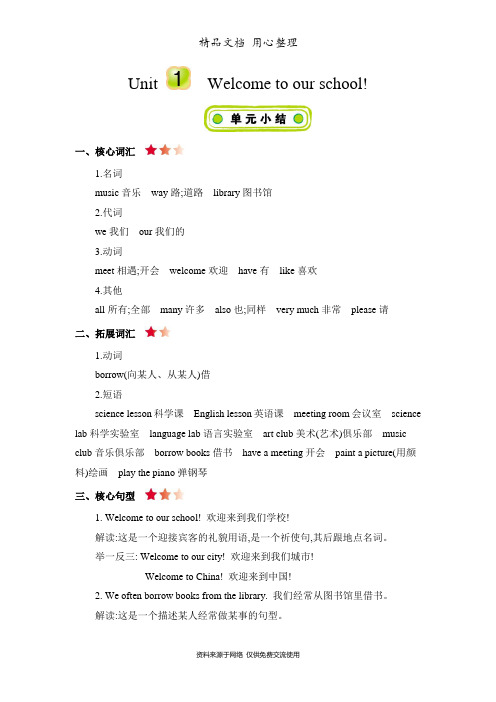
Unit Welcome to our school!一、核心词汇1.名词music音乐way路;道路library图书馆2.代词we我们our我们的3.动词meet相遇;开会welcome欢迎have有like喜欢4.其他all所有;全部many许多also也;同样very much非常please请二、拓展词汇1.动词borrow(向某人、从某人)借2.短语science lesson科学课English lesson英语课meeting room会议室science lab科学实验室language lab语言实验室art club美术(艺术)俱乐部music club音乐俱乐部borrow books借书have a meeting开会paint a picture(用颜料)绘画play the piano弹钢琴三、核心句型1. Welcome to our school! 欢迎来到我们学校!解读:这是一个迎接宾客的礼貌用语,是一个祈使句,其后跟地点名词。
举一反三: Welcome to our city! 欢迎来到我们城市!Welcome to China! 欢迎来到中国!2. We often borrow books from the library. 我们经常从图书馆里借书。
解读:这是一个描述某人经常做某事的句型。
举一反三: They often borrow some English books from Beijing Library. 他们经常从北京图书馆里借一些英语书。
3. —How many English lessons do you have in a week? 你们一周有多少节英语课?—We have three. 我们有三节。
解读:这是用来询问对方有多少节课的句型。
举一反三: —How many PE lessons do you have in a week? 你们一周有多少节体育课?—We have five. 我们有五节。
五年级下册英语知识点总结归纳

五年级下册英语知识点总结归纳五年级下册英语知识点总结归纳成功需要成本,时间也是一种成本,对时间的珍惜就是对成本的节约。
接下来店铺为大家编辑整理五年级下册英语知识点总结归纳,希望对大家学习英语有所帮助。
五年级下册英语知识点:名词这里强调两点:不可数名词都默认为单数,所以总是用is或者was。
单数名词表示一个可数事物。
复数名词表示两个或两个以上的可数事物。
1).规则变化①一般在名词后加s.如boy→boys, pen→pens等。
②以s, x, sh, ch结尾的,在后面加es.如bus-buses, box-boxes, brush-brushes, watch-watches.③“以辅音字母+y”结尾的,y变为i,然后再加es.如baby→babies.④以f或fe结尾的名词把f或fe改为v, 再加es. 如knife, half, leaf, wolf等。
⑤以o结尾的名词,除tomato, potato等少数在后面加es外,一般是在后面直接加s.如kilo→kilos,photo→photos,zoo→zoos, radio→radios, piano→pianos, video→videos.2).不规则变化man→men, woman→women, foot→feet, tooth→teeth,,child-children,mouse→mice单复数形式相同如:sheep→sheep, deer→deer, Japanese→Japanese, Chinese→Chinese等。
有些名词形式上是单数,实为复数意义,通常被称为复数名词,如:people, police等。
由-man和-woman构成的合成词如:policeman→policemen, Englishman→Englishmen,Englishwoman-Englishwomen但German不是合成词,故复数形式为Germans.另外被man 或woman 修饰的'名词变复数时,两个名词都要变。
人教版PEP小学英语五年级下册知识点汇总(最新)
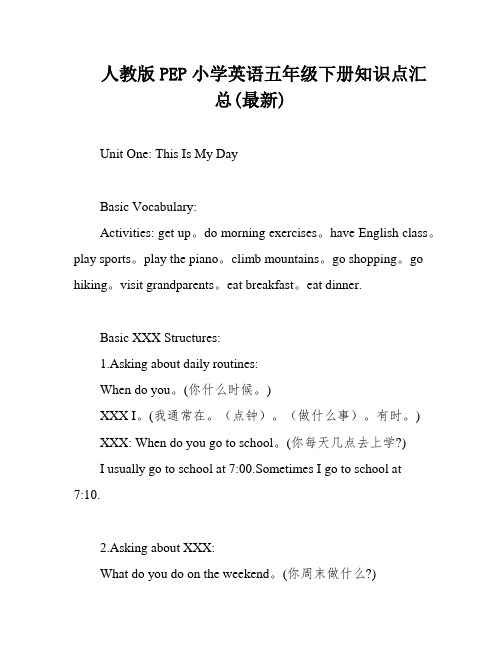
人教版PEP小学英语五年级下册知识点汇总(最新)Unit One: This Is My DayBasic Vocabulary:Activities: get up。
do morning exercises。
have English class。
play sports。
play the piano。
climb mountains。
go shopping。
go hiking。
visit grandparents。
eat breakfast。
eat dinner.Basic XXX Structures:1.Asking about daily routines:When do you。
(你什么时候。
)XXX I。
(我通常在。
(点钟)。
(做什么事)。
有时。
)XXX: When do you go to school。
(你每天几点去上学?)I usually go to school at 7:00.Sometimes I go to school at7:10.2.Asking about XXX:What do you do on the weekend。
(你周末做什么?)XXX I。
(我通常/经常。
有时。
)XXX: What do you do on the weekend?I often play XXX I go shopping with my mom.3.Introducing one's own habits:Every weekend。
I go hiking。
(我每个周末远足。
)Every day。
I do my homework at 8:00 in the evening。
(我每天晚上8点做作业。
)4.Asking XXX:What do you do。
(你是干什么的?)Time:morning。
afternoon。
evening。
noon。
at night。
6:00.on Sunday。
人教精通版五年级英语下册全册知识点总结

人教精通版五年级英语下册全册知识点总结知识点总结Unit 1 Welcome to our school!【词汇】library 图书馆borrow (向某人、从某人)借borrow books 借书meeting room 会议室have a meeting 开会welcome 欢迎meet 相遇;开会our 我们的science lab 科学实验室science lesson 科学课language lab 语言实验室English lesson 英语课we 我们have 有all 所有;全部like 喜欢very much 非常;很art club 美术(艺术)俱乐部paint a picture (用颜料)绘画music club 音乐俱乐部play the piano 弹钢琴many 许多music 音乐way 路;道路please 请also 也;同样【句型】1. We\\\\\\\\\'ll show you around our school. 我们会带你参观我们学校。
2. Look! This is our library. 看!这是我们的图书馆。
3. —Do you often come to the library?你经常去图书馆吗?—Yes. We often borrow books from the library.是的。
我们经常从图书馆借书。
4. This way, please. This is our meeting room.这边请。
这是我们的会议室。
5. Welcome to our school. 欢迎来到我们学校。
6. —How many science lessons do you have in a week?你们一周有多少实验课?—We have two. 两节。
7. —Do you like English? —Yes. We all like it.你喜欢英语吗?喜欢。
(完整版)人教版PEP五年级下册英语知识点复习总结
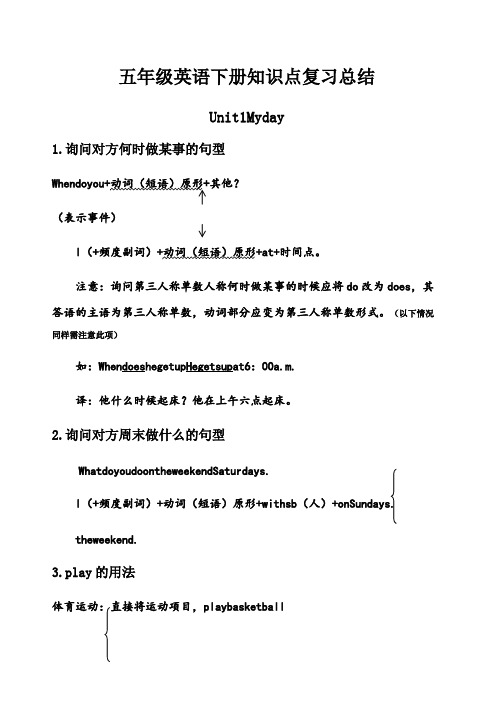
五年级英语下册知识点复习总结
Unit1Myday
1.询问对方何时做某事的句型
Whendoyou+动词(短语)原形+其他? (表示事件)
I(+频度副词)+动词(短语)原形+at+时间点。 注意:询问第三人称单数人称何时做某事的时候应将 do 改为 does,其 答语的主语为第三人称单数,动词部分应变为第三人称单数形式。(以下情况
同样需注意此项)
如:WhendoeshegetupHegetsupat6:00a.m. 译:他什么时候起床?他在上午六点起床。
2.询问对方周末做什么的句型
WhatdoyoudoontheweekendSaturdays. I(+频度副词)+动词(短语)原形+withsb(人)+onSundays. theweekend.
(2)在基数词后加 th:除去 first,second,third,其他基数词变序数词一般 直接在其后加 th。注意 five 与 twelve 要先把 ve 变 f,再加 th;eight 直接加 h;nine 去 e 再加 th。
(3)整十序数词以 ieth 结尾:整十位的序数词先将十位整数词尾的 y 变为 i, 再加 eth。如:twenty-twentieth。
The
注意:play-plays 因为 a 是元音 3)以 ch,sh,s,x 或 o 结尾的动词,在后面加-es; 例如 teach-teacheswash-washesdo-doesgo-goesfix-fixes
4)不规则的; 例如 have-has
5.by 的用法
冀教版(三起)五年级英语下册全册知识点汇总

冀教版(三起)五年级英语下册全册知识点汇总UNIT Going to Beijing一、核心词汇1.和动作相关的单词jump跳;跳跃run跑dance跳舞sing唱;演唱sit坐stand站立;直立look看;瞧see看见;明白;会见(过去式为saw) draw画cry哭;哭泣;喊叫sleep睡觉;入睡talk交谈;讨论2.和食物相关的单词tea茶water水candy糖果3.方位介词down向下;朝下;沿着up向上,在上面4.人物名词man男人woman女人baby婴儿boy男孩girl 女孩5.其他now现在who谁picture图画;照片hungry饥饿的sorry 对不起,不好意思(道歉时用)6.动词短语look at看(某人或某物) look out of从……向外看二、拓展词汇1.其他和食物相关的单词noodles面条dumplings饺子hamburger汉堡包bread面包2.其他常见时间副词yesterday昨天tomorrow明天三、核心句型1.Please don’t run! 请不要跑!解读:此句是祈使句的否定形式,表示不许做某事。
举一反三: Please don’t open the window.It’s cold outside.别开窗户,外面很冷。
Don’t speak in class.课上不要说话。
2.I want to sing! 我想唱歌!解读:此句是表达某人想做某事的句型。
举一反三: I want to visit my grandmother.我想去看望我奶奶。
She wants to go swimming.她想去游泳。
3.— Jenny, what are you doing now?詹妮,你现在正在做什么?— I am drawing a picture.我正在画画。
解读:这是询问某人正在做什么的句型。
举一反三: — What is she doing?她正在做什么?— She is watching TV.她正在看电视。
五年级下册英语知识点整理
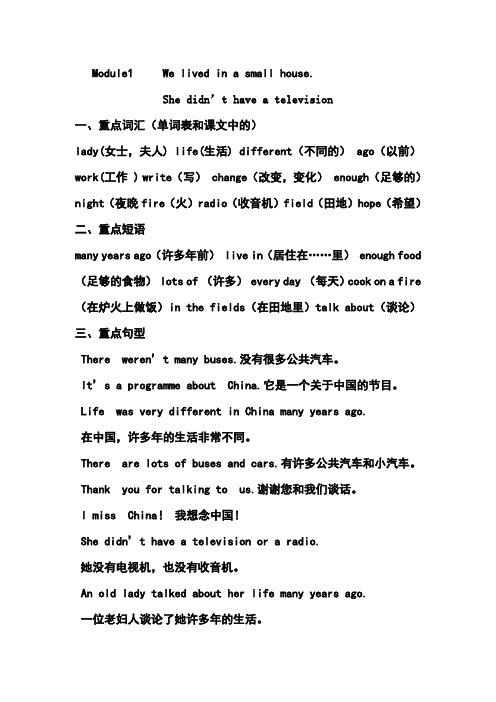
Module1 We lived in a small house.She didn’t have a television一、重点词汇(单词表和课文中的)lady(女士,夫人) life(生活) different(不同的) ago(以前)work(工作 ) write(写) change(改变,变化) enough(足够的)night(夜晚fire(火)radio(收音机)field(田地)hope(希望)二、重点短语many years ago(许多年前) live in(居住在……里) enough food (足够的食物) lots of (许多) every day (每天)cook on a fire (在炉火上做饭)in the fields(在田地里)talk about(谈论)三、重点句型There weren’t many buses.没有很多公共汽车。
It’s a programme about China.它是一个关于中国的节目。
Life was very different in China many years ago.在中国,许多年的生活非常不同。
There are lots of buses and cars.有许多公共汽车和小汽车。
Thank you for talking to us.谢谢您和我们谈话。
I miss China!我想念中国!She didn’t have a television or a radio.她没有电视机,也没有收音机。
An old lady talked about her life many years ago.一位老妇人谈论了她许多年的生活。
She couldn’t read or write. 她不会读也不会写。
四、自然拼读ai,ay /ei/ rain play al,au /ɔ: / walk autumn ar/ɑ:/ farmer party ar/ɔ:/ warm quarter五、背诵重点:课文第二部分六、语法点:过去式Module 2 She learnt English.Mr Li was a teacher.一、重点词汇learnt 学习(learn的过去式) foreign(外国的) studied 学习(study的过去式) language(语言) taught 教,讲授(teach 的过去式) wrote 写(write的过去式) dancer(舞蹈演员) hard (努力地)二、重点短语Foreign language(外语) learn English(学习英语) make a cake(做蛋糕)twenty years ago(二十年前)in his class(在他班里) a good pupil(一个好学生) an English teacher(一位英语老师) walk to school(步行去上学) by school bus(乘坐校车)三、重点句子Did she learn any foreign language她学过外语吗But he’s learning English now.但是他现在正在学习英语。
五年级下册英语-全册知识点归纳 译林版

五年级下册英语-全册知识点归纳译林版Unit 1 Cinderella单词:prince(王子),fairy(仙女),why(为什么),because(因为),clothes(衣服),let(让),put on(穿上),before(在……以前),try on(试穿),have to(不得不;必须),fit(合适,合身),take off(脱下),mushroom(蘑菇),late(迟的,晚的),understand(明白,理解),pick(摘,拾),be bad for(有害的),leave。
behind(留下,丢下)重点词组:1.在王子的房子(at the prince's house)2.如此伤心(so sad)3.参加舞会(go to the party)4.拜访每一间屋子(visit every house)5.回来(XXX)6.过得愉快(have a good time)7.在聚会(at the party)8.脱下(take off)9.试穿(try on)10.必须走(have to go)11.留下,丢下(leave。
behind)12.在深林里(in the forest)13.在一棵树下(under a tree)14.摘一个大红色的蘑菇(pick a big red mushroom)15.看起来很漂亮(look so nice)16.对我们有害的(be bad for us)17.美猴王(Money King)18.读一个有关……的故事(read a story about。
)19.在学校研究(be at school)重点句型:1.过来帮我(Come and help me.)2.亲爱的,为什么你这样伤心?(Why are you so sad。
dear?)3.因为我没有任何漂亮的衣服和鞋子(Because I don't have any nice XXX)4.快点!(Hurry up!)5.我们可以吃它们了(We can eat them.)6.真可惜!(What a pity!)7.你为什么不能去参加舞会?(Why can't you go to the party?)8.我的脚受伤了!(My foot hurts!)9.我喜欢读猴王和XXX的故事(I like reading stories about the Monkey King and Nezha.)10.许多女孩试穿这双鞋,但是都不合适。
人教版五年级英语下册全册知识点总结
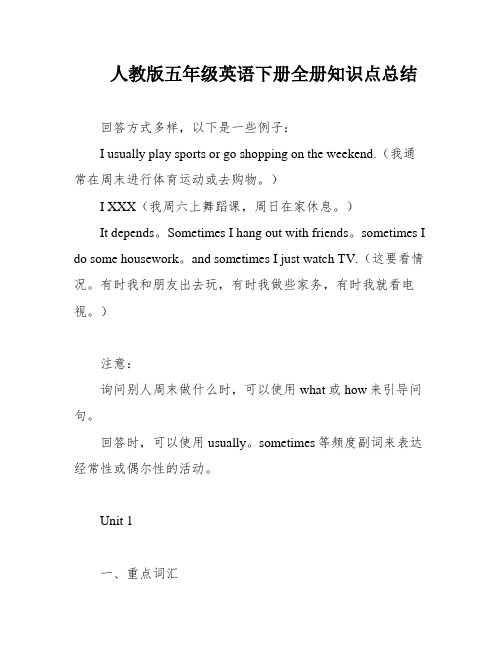
人教版五年级英语下册全册知识点总结回答方式多样,以下是一些例子:I usually play sports or go shopping on the weekend.(我通常在周末进行体育运动或去购物。
)I XXX(我周六上舞蹈课,周日在家休息。
)It depends。
Sometimes I hang out with friends。
sometimes I do some housework。
and sometimes I just watch TV.(这要看情况。
有时我和朋友出去玩,有时我做些家务,有时我就看电视。
)注意:询问别人周末做什么时,可以使用what或how来引导问句。
回答时,可以使用usually。
sometimes等频度副词来表达经常性或偶尔性的活动。
Unit 1一、重点词汇吃早餐:eat breakfast 上······课:have。
class进行体育运动:play sports做早操:do morning exercises 打扫我的房间:clean my room 去购物:go shopping舞蹈:dancing上午:a.m.通常地:usually二、其他日常活动起床:get up上床睡觉:go to bed活动,运动:exercise吃晚饭:eat XXX散步:go for a walk研究,上(课):XXX上舞蹈课:take a dancing class下午:p.m.吃午饭:eat XXX洗脸:XXX洗我的衣服:XXX看电视:watch TV打乒乓球:play ping-pong弹琵琶:play the pipa去游泳:go swimming去跑步:go running做作业:do homework练武术:do XXX踢足球:play football打篮球:play basketball三、语音cl→ [cl]:clean。
人教版五年级英语下册知识点总结

人教版五年级英语下册全册知识点Unit 1 My day一、重点词汇。
1.四会词汇:eat breakfast吃早饭 have···class 上······课 play sports 进行体育运动 exercise 活动;运动 do morning exercises做早操 eat dinner吃晚饭 clean my room 打扫我的房间 go for a walk 散步 go shopping 去买东西;购物 take学习;上(课) dancing跳舞;舞蹈 take a dancing class 上舞蹈课2. 三会词汇:when什么时候after 在(时间)后start 开始usually 通常地;惯常地Spain 西班牙late 晚;迟 a.m. 午前;上午 p.m. 午后;下午 why 为什么shop 去买东西;购物work 工作last 上一个的;刚过去的sound 听起来好像 also 还;也 busy 忙的 need 需要 play 戏剧;剧本letter 信live 居住island 岛always 总是;一直cave 山洞;洞穴go swimming 去游泳 win 获胜二、其他日常活动。
get up起床 eat lunch吃午饭 go to bed 上床睡觉wash my face洗脸 wash my clothes 洗我的衣服 watch TV看电视 play ping-pong打乒乓球 playthe pipa弹琵琶 go swimming去游泳 go running去跑步 do homework 做作业 do kung fu练武术 play football踢足球 play basketball打篮球三、频度副词。
always总是,一直(100%) usually通常(80%) often 经常(60%) sometimes(30%)有时四、疑问词。
人教版PEP小学英语五年级下册unit1至unit3知识点归纳
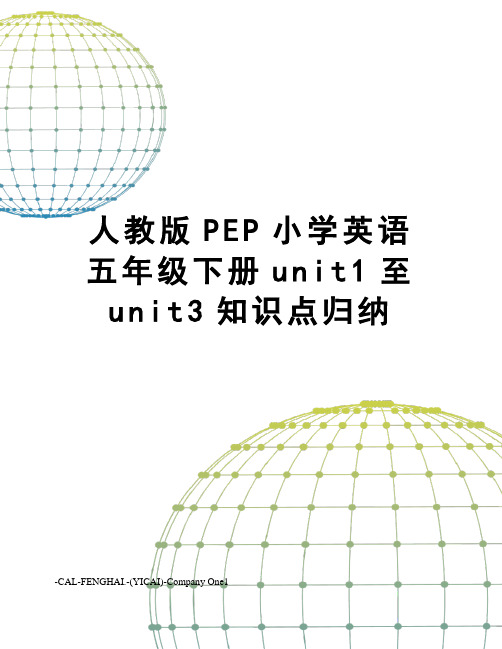
人教版P E P小学英语五年级下册u n i t1至u n i t3知识点归纳-CAL-FENGHAI.-(YICAI)-Company One1五年级下册Unit 1-3重点难点、单元单词、短语和知识点知识梳理第一单元知识点一、主要单词:do morning exercises晨练,做早操 eat breakfast吃早饭 have English class上英语课 play sports进行体育活动 eat dinner吃晚饭 eat lunch吃午饭 climb mountains爬山 go shopping购物,买东西 play the piano弹钢琴 visit grandparents看望(外)祖父母 go hiking去远足二、主要句子:When do you eat dinner你什么时候吃晚饭I eat dinner at 7:00 in the evening.我晚上七点吃晚饭。
When do you get up你什么时候起床I usually get up at 12:00 at noon.我通常在中午12点起床。
What do you do on the weekend你在周末干什么Usually I watch TV and go shopping.我通常看电视和购物。
Sometimes I visit my grandparents.有时候我去看望我的外祖父母。
I often play football.我经常踢足球。
Sometimes I go hiking.有时候我去远足。
三、同义词eat breakfast—have breakfast eat lunch—have luncheat dinner—have dinner play sports—do sports usually—often复数形式:policeman—policemen policewoman—policewomen现在分词:tell—telling三单:say—says同义句:What do you do ---What are you你是干什么的四、表示频度的副词:always总是,一直 usually通常,常常 often经常 sometimes有时候五、以复数形式出现的词组:visit grandparents plant trees介词后跟表示时间的词语时,表示在某年、某月、某个季节,某个时候(在上午,在下午,在晚上)用in;表示在某一天,在星期几用on,在具体的几点几分用at.七、too 和either的用法区别:too和either都是“也”的意思,但too用于肯定句,either用于否定句。
五年级英语下册知识点

五年级英语下册知识点上学期间,很多人都经常追着老师们要知识点吧,知识点是传递信息的基本单位,知识点对提高学习导航具有重要的作用。
想要一份整理好的知识点吗?下面是店铺整理的五年级英语下册知识点汇总,欢迎大家借鉴与参考,希望对大家有所帮助。
一、重点单词用法1. call v. 称作 What do you call it in English?2. like v. 喜欢sth. I like English very much.like to do sth. I like reading very much, but I don’t like to read now.doing sth.3. let’s + 动词原形Let’s (=let us) make animals. let sb. do sth. 让某人做某事4. want v. 想,想要want sth. I want a piece of paper.to do sth. I want to watch TV.5. 情态动词情态动词很简单,没有人称数之变,动词原形后边站,can表能力may许可should应该would愿must必须,否定needn’t换have to不得不表客观二、重点语法A) 一般现在时1. 概念:一般现在时表示经常的、习惯性的动作或存在的状态。
2. 构成:一般现在时的构成主要有两种形式:(1)be型:句子的谓语动词只有be(am,is或are):a.肯定句中,只出现be,如:I am a student.我是一名学生。
b.否定句中,要在be后面加not,如:She isn't a teacher.她不是教师。
c.一般疑问句,要将be放在句子开头(注意句首字母大写),句尾用问号,答语用Yes,主语+be.或No,主语 + be + not.如:—Are you ready?—你准备好了吗?—Yes,I am.—是的,我准备好了。
(完整版)五年级英语下册知识点整理

五年级下册知识点整理Unit 1May I speak to Mary?一、重点词汇:speak 说,讲注意句子中的长元音/i:/afternoon 中午注意句子中的字母组合的发音/u:/job 工作(可数)work 不可数learn 学习(教授)study 学习(自学)重点短语:use your bike go home now ask you a question watch TV now二、重点句型1.May I speak to sb.?2.May I use your……?3.She is not in.她不在4.Can you ask her to call me this evening?5.What are you doing now?I am having lunch.6.What about=How about7.Can I learn how to make it?8.Let’s me put some meat on it,OK?9.You did a good job.三、重点语法1.情态动词can/may 表示请求,委婉的态度,后面加动词原形2.现在进行时的用法Unit2 We mustn’t cross the street now?一、重点词汇:must 必须,后面加动词原形street 街道,注意单词中的ee的字母组合answer 回答,答复cross 动词:穿过重点短语:Answer the question 回答问题All right 好No left turn 不要xxleft turn xxno parking 禁止停车parking 停车No u-turn 不能转弯U-turn 转弯二、重点句型1.Are you going shopping?2.You mustn’t run in the street.3.You mustn’t cross the street here.4.You can cross the street there.5.I should give my seat to her.三、重点语法情态动词must的用法Must+动词原形Unit3 How many pupils are there?一、重点词汇短语Blackboard 黑板pupil 小学生Paper 纸张should 应该Pick 捡起throw away 扔掉Pick up捡起二、重点句型1. How many pupils are there in your class this term?2. There are/is n.3. we have a new clock and we have some green plants.4. This make the streets and parks very dirty.5.Many of the things are useful.6.The pupils are doing a good job, and they are very happy.三、重点语法1.there be句型2.数词的用法—基数词Unit4Where do you live?一、重点词汇Live 居住town 注意发音Sick 病的注意ck的发音Come from 来自Be ready to 愿意做某事二、重点句型1.Where do you come from?2.Where do you live?3. Where are you from?4.Why are you crying?5.He is always ready to help others.6.They walked for along time.7.The farmer took our some money. Unit 5 What do you do?一、重点词汇Easy 容易的kind xx的Choose选择Which 哪一个Manager 经理Interesting 有趣的二、重点句型1.What do you do?2. Where do you work?3. Is your work interesting?4. Go and find your manager.5.Now Mr. Smith knows who to choose. Unit7It’s seven thirt y-five一、重点词汇Breakfast 早餐Monday 周一Fifty 50Way 路Try 尝试Tuesday 周二Thursday 周四Wednesday 周三Fill 填满On the way 在……路上二、重点句型1.What time is school over?2. What about Monday and Wednesday ?3. What time is it?4. It’s time for school.5. On the way they see a boy.6.They try to take the ball out.7. They get some water and fill the hole with it.8. The boy smiles and thanks them for their help.三、重点语法1.数词—家属次2.时间的表示方法和提问Unit8 What day is it today?一、重点词汇Math 数学Art 艺术PE 体育Science 科学Subject 学科When 当……的时候Lesson 课Hope 希望Soon 不久二、重点句型1.What day is it today?2.What classes do you have this morning?3.When do you have English?4.We have Chinese and PE.5.I want to make a new timetable.6.Lulu is writing an email to her now.7.Let me tell you what we did today.8.Hope to see you soon.三、重点语法1.星期的说法2.关于科目的单词3.关于课程的询问Unit 9 Do you always have lunch at twelve?一、重点词汇Rice soup exercise kitchen toilet early bedroom usually短语:have lunch 吃午饭get up 起床do morning exercise 做晨练二、重点句型1.What time is it?2. Do you always have lunch at twelve?3.What do you usually have for lunch?4.I always do morning exercises at 7:10.5. I have to run to school.6.The clock in my room isn’t working.三、重点语法1.时间的询问2.一般疑问句和特殊疑问句Unit10 Does she always come before six thirty?一、重点词汇Before afraid stand suddenly someone get out each other二、重点句型1.Where is she today?2. Does she always come before six thirty?3.I am afraid she isn’t feeling well today.4. Suddenly they hear someone crying.5.Then they have an idea.6. They get a lot of grass and throw the grass onto the pit.三、重点语法1.一般疑问句的单三形式2.动词短语的积累Unit11. When do you usually get up?一、重点词汇Far minute by slow daughter telephone ring短语By bike on foot have breakfast for a minute二、重点句型1.When do you usually get up?2. How do you usually go to school?3. Her home is not far from the school.4.What time does peter go to school?5.How is he going?6.When so they go to bed?7.He talks to her for a minutes.8. Why are you still having breakfast?三、重点语法问时间的特殊疑问句Unit12.Revison重点句型1.What day is it taday?2.What time is it?3.When do you usually get up?4.How do you usually go to school?5.The TV is on the wall.6.When I talk to my friend on it, I can see him.7.I often use it to send emails to my friends.8.I want a machine to help me so my homework.。
- 1、下载文档前请自行甄别文档内容的完整性,平台不提供额外的编辑、内容补充、找答案等附加服务。
- 2、"仅部分预览"的文档,不可在线预览部分如存在完整性等问题,可反馈申请退款(可完整预览的文档不适用该条件!)。
- 3、如文档侵犯您的权益,请联系客服反馈,我们会尽快为您处理(人工客服工作时间:9:00-18:30)。
五年级下册英语课本知识点总结第一单元单元课题:My day主要内容:(1)三会单词(听说读)when, after, start, usually, Spain, late, a.m., p.m., why, shop, work, last, sound, also, busy, need, play, letter,live, island, always, cave, win(2)三会短语go swimming(3)四会单词(听说读写)exercise, take, dancing(4)四会短语eat breakfast, have… class, play sports, do morningexercise, eat dinner, clean my room, go for walk, goshopping, take a dancing class(5)四会句型①——When do you finish class in the morning/afternoon?—— We finish class at … o’clock.②—— What do you do on …?—— I often do sth. with sb.(6)重点语法点① When引导的特殊疑问句,就作息时间进行问答:—— When do you + 行为活动?—— I + 行为行动 + 具体时间。
e.g. —— When do you eat dinner?—— I eat dinner at 7:00.② What引导的特殊疑问句。
就活动内容进行问答:—— What do you do + 时间?—— I + sometimes/ often/usually +行为活动 + 时间。
Sometimes/ Usually/ Often + I + 行为活动 + 时间。
e.g. —— What do you do on the weekend?—— I often play football.第二单元单元课题:My favourite season主要内容:(1)三会单词(听说读)which, best, snow, because, vacation, all, pink, lovely, leaf(复数leaves), fall, paint(2)三会短语good job(3)四会单词(听说读写)spring, summer, autumn, winter, season, picnic, pick, snowman(4)四会短语go on a picnic, pick apples, make a snowman, go swimming (5)四会句型①—— Which season do you like best?—— Spring/ Summer/ Autumn/ Winter.②—— Why?—— Because ….(6)重点语法点:① Which 引导的特殊疑问句,谈论最喜欢的季节:—— Which season do you like best? /What's your favourite season?—— I like + 季节 + best.② Why 引导的特殊疑问句,谈论喜欢某个季节的原因:—— Why do you like + 季节?—— Because I can + 行为活动.第三单元单元课题:My school calendar主要内容:(1)三会单词(听说读)few, thing, meet, Easter, trip, year, plant, contest, national, American, Thanksgiving, Christmas, holiday, game ,roll, chocolate, bunny, RSVP, by(2)三会短语a few, sports meet, the Great Wall, National Day, lookfor(3)四会单词(听说读写)January, February, March, April, May, June, July, August, September, October, November, December(4)四会句型①—— When is the party?—— It’s in + month.②—— When is the trip this year?—— It’s in + month. (5)重点语法点:When引导的特殊疑问句,就节日或活动的时间进行问答“—— When is the + 节日/ 活动?—— It’s in + 月份。
eg: —— When is the party?—— It’s in April. 第四单元单元课题:When is the Easter?主要内容:(1)三会单词(听说读)special, fool, kitten, diary, still, noise, fur, open,walk(2)四会单词(听说读写)first(1st), second(2nd), third(3rd), fourth(4th), fifth(5th), twelfth(12th), twentieth(20th), twenty-first(21st), twenty-third(23rd), thirtieth(30th)(3)四会句型①—— When is the April Fool’s Day?—— It’s on + month + day(序数词).②—— When is your birthday?—— My birthday is on + month + day(序数词). (4)重点语法点:① When引导的特殊疑问句,就什么时候是什么节日进行问答。
—— When is + 节日?—— It’s on + 月份 + 日期。
eg: —— When is the April Fool’s Day?—— It’s on April 1st.②When引导的特殊疑问句,就什么时候过生日进行问答:—— When is + your/ his/ her birthday?—— My/ his/her birthday is on + 月份 + 日期。
③What 引导的一般将来时的特殊疑问句进行问答:—— What will you do for sb.?—— I’ll do sth for him/ her.eg. —— What will you do for your mum?—— I’ll cook noodles for her.第五单元单元课题:Whose dog is it?主要内容:(1)三会单词(听说读)each, other, excited, like(2)四会单词(听说读写)mine, yours, his, hers, theirs, ours, climbing, eating, playing, jumping, drinking, sleeping(3)四会句型① The … is mine.②—— Are these all ours?—— Yes, they are./ No, they aren’t.③—— Whose is it.—— It’s ×××’s.④—— Is he/she doing sth?—— Yes, he/ she is.No, he/ she isn’t.(4)重点语法点① whose引导的特殊疑问句,询问某样物品是某人的:A. —— Whose + 物品(单数) + is this/ that?—— It’s ×××’s/ mine/ his/ hers.eg. —— Whose book is that?—— It’s Amy’s.B. —— Whose + 物品(复数) + are these/ those?—— They’re ×××’s/ mine/ his/ hers.eg. —— Whose storybooks are these?—— They’re mine.B. —— Whose is it?—— It’s ×××’s/ mine/ his/ hers.② Where引导的特殊疑问句,询问某人在哪里:—— Where is ×××?—— He’s/ She’s in + 地点。
③ Is引导的现在进行时的一般疑问句:—— Is he/ she doing sth ?—— Yes, he/ she is.No, he/ she isn’t.第六单元单元课题:Work quietly!主要内容:(1)三会单词(听说读)bamboo, its, show, anything, else, exhibition, say, sushi,teach, sure, Canadian, Spanish(2)三会短语have a look(3)四会单词(听说读写)keep, turn(4)四会短语doing morning exercise, having … class, eating lunch, reading a book, listening to music, keep to the right, keep your desk clean, talk quietly, take turns(5)四会句型①—— What are they doing?—— They’re doing sth.②—— What’s he/ she/ it doing?—— He’s/ She’s/ It’s doing sth.③ Shh. Talk quietly.④ Keep sth. clean.(6)重点语法点:① What引导的特殊疑问句,询问某人正在做什么:A. —— What is he/ she/ it/ sb. doing?—— He’s/ She’s/ It’s doing sth.eg. —— What’s the little monkey doing?—— It’s playing with its mother.B. —— What are they doing?—— They’re doing sth.eg. —— What are they doing? —— They are eating the lunch.。
